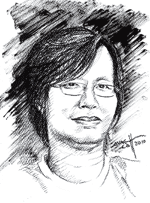
| By KYAW ZWA MOE | Wednesday, July 27, 2011 |
Once again, Burma's rulers have initiated “talks” with pro-democracy leader Aung San Suu Kyi. On Monday, a government minister met with Suu Kyi for the first time since a new quasi-civilian government was formed at the end of March. But is this the start of a meaningful dialogue aimed at achieving national reconciliation, or just another empty gesture designed to placate international opinion?
There is no doubt that dialogue is the best way to resolve a host of issues facing Burma: a decades-long stalemate between the government and pro-democracy groups; ongoing skirmishes between government troops and ethnic armies; human rights violations, especially in remote areas; the continuing detention of political prisoners; a perennially struggling economy; economic sanctions; and the country's tarnished international image.
 |
| Kyaw Zwa Moe is managing editor of the Irrawaddy magazine. He can be reached at [email protected]. |
So how about this week's encounter at the Sane Lae Kan Thar government guest house in Rangoon, where Suu Kyi spoke with Labor Minister Aung Kyi for about one hour?
This was not the first time the two have met. Aung Kyi has spoken in person with Suu Kyi a total of 10 times since October 2007, when he was named the “liaison minister” under the previous military regime.
Despite the poor record of past talks, Aung Kyi was quick to reject any suggestion that nothing had ever come of them. “There were some benefits from previous meetings,” he told reporters soon after the meeting on Monday, at a joint press briefing with Suu Kyi.
What those “benefits” were, however, he did not say. Presumably, he was speaking only from the perspective of the preceding regime, which has made a relatively smooth transition to “civilian” rule under the military-backed Union Solidarity and Development Party (USDP), thanks in large part to its success in neutralizing Suu Kyi's National League for Democracy (NLD).
Aung Kyi went on to suggest that this latest meeting marked the beginning of a new stage in the relationship between the two sides—again, without specifying: “You can say this meeting is the first step of a series of things on which we intend to cooperate further.”
Suu Kyi also confined herself to diplomatic generalities. She knows that she has to proceed carefully: after all, she has been here many times before. In the 1990s and early 2000s, she met with leaders of the previous military regime, including ex-senior general Than Shwe, his deputy Maung Aye, and ex-military intelligence chief Khin Nyunt (currently under house arrest). If you include other middle- and high-ranking officials, she has held dozens of such talks over the years.
Perhaps the most encouraging of those meetings came in the early part of the last decade, when they led to the release of dozens of detained NLD members and Suu Kyi visited a number of infrastructure projects to witness the progress the junta had made since seizing power in 1988.
But that brief moment of hope was soon swept away when regime-backed thugs attacked Suu Kyi's motorcade during a visit to Upper Burma in May 2003. That incident resulted in Suu Kyi being placed back under house arrest, where she remained until she was released a week after last year's election in November.
Since Suu Kyi's release alone has not sufficiently thawed international opinion toward Burma's rulers, the new government must have decided that it was finally time to reach out to her directly. As in the past, this gesture appears to have had some effect.
Soon after Monday's meeting, UN Secretary-General Ban Ki-moon said he welcomed the move, and noted in a statement that “The parties have expressed satisfaction at their positive talks and their intention to cooperate further on matters beneficial to the people of Myanmar [Burma].”
Other Burma observers have also expressed optimism about the possibility of more tangible results coming out of this meeting. But are such hopes well-founded? It's difficult to conclude, based on past experience, that this is anything more than a PR exercise designed to bolster the new government's legitimacy.
The talks themselves aren't likely to achieve this end, but they could ease the way toward another coveted goal—the government's bid to assume the chairmanship of the Association of Southeast Asian Nations (Asean) in 2014—which would effectively end Burma's decades-old status as an international pariah and, in turn, raise the stature of current government in the yes of the world and Burma's citizens.
But Asean has already indicated that the Burmese government needs to take concrete actions, such as dialogue with opposition groups and the release of all political prisoners, before it can become chairman of the regional grouping.
Another hurdle is US opposition to granting Burma a position on the world stage that it clearly doesn't deserve. Last week, US Secretary of State Hillary Clinton signaled her disapproval of Burma's attempts to assume the Asean chair at the US-Asean Ministerial Meeting in Indonesia.
“We trust that Asean members will gauge whether a potential chair can advance the organization's credibility and leadership role in the region,” Clinton said, calling for the release of political prisoners and dialogue with the opposition as conditions for considering Burma's request.
“The choice is clear,” she said. “They [the Burmese government] can take these steps and gain back the confidence of their people and the trust of the international community. Or they can continue down the path they've been on.”
The government is clearly unwilling to make such a choice, but it is hoping that it can convince Asean that it is moving in the right direction by playing the Suu Kyi card. This means that it will talk up the “talks” for as long as it can, until it becomes impossible to maintain the pretense any longer.
At that point, Asean will be forced to acknowledge that Burma is unfit to be its chairman, and the talks will end as abruptly as they began.